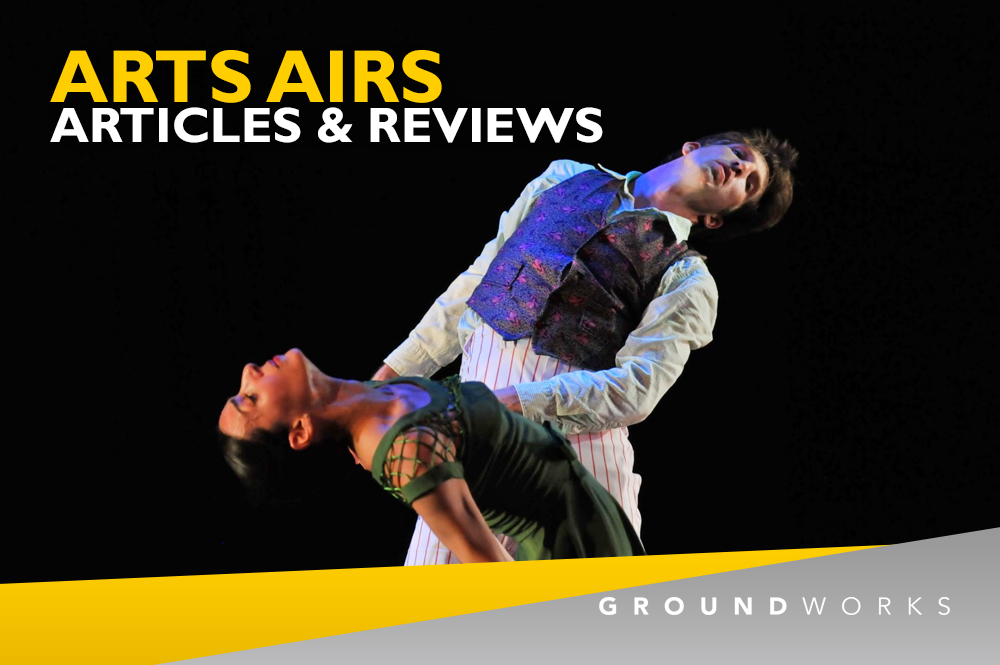Project Description
Arts Airs – Broken Hearts and Broken Minds Highlight GroundWorks’ Emotionally Penetrating Fall Program
By Steve Sucato, Arts Airs
Whoever coined the phrase “bigger is better” could not have accounted for what Cleveland-based GroundWorks DanceTheater has been able to accomplish with just five dancers. In its 16th season the tiny troupe led by artistic director David Shimotakahara has an impressive body of work by a host of prominent choreographers. With a focus on the creation of new dance works from established and up and coming choreographers the company continues to amaze. Their Fall dance program at PlayhouseSquare’s Allen Theatre in Cleveland proved no different bringing together three marvelous dance works created for the company that included the world-premiere of German choreographer Johannes Wieland’s wait. now. go. now.
The well-balanced program on October 24 began with a reprise of choreographer Gina Gibney’s 2003 work, Always. Set to five heartfelt songs from Patsy Cline’s “The Last Sessions” album, the piece opened on dancer Noelle Cotler center stage, in spotlight, spinning in place as Cline’s “Someday (You’ll Want Me To Want You)” figuratively poured from a jukebox set piece at the rear of the stage. Swirling her head and torso, Cotler vacillated between expressions of pensiveness and defiance thinking of some unseen lover.
A mostly sweet, sensitive and occasionally humorous work, Always climbed aboard the roller coaster called love and rode through a series of vignettes that illustrated the ups and downs of romantic relationships.
Next, performing to Cline’s “Love Letters in the Sand,” Cotler became the object of affection for dancers Damien Highfield and Troy Macklin who vied for her attention and the honor of holding her beach skirt. The two men engaged in a tug of war with it before Cotler coquettishly stepped between them and humorously into the skirt.
The work’s most engaging vignette followed in which dancer Annika Sheaff sheepishly made dreamy eyes at a disheartened Highfield who lost Cotler to Macklin. Danced to Cline’s “You Took Him Off My Hands,” the pair performed a slow-motion courtship around the jukebox as a distracted Cotler, in the arms of Macklin, stole regretful glances toward Highfield.
The original “shoegazer” music, Cline’s melodic and melancholy songs created a hazy atmosphere for Always in which Gibney’s gestural choreography flourished. Its vignettes about longing and heartache struck familiar emotional chords to all of us.
Whereas Always presented common relationship realities, Wieland’s dance-theater work wait. now. go. now., delved into what appeared to be a break from reality.
On a bare stage devoid of curtains and drops, Macklin – as Cotler did in Always,only with more veracity – spun in circles until he fell to the floor while Sheaff dragged the limp body of Highfield across the floor behind him.
Like some acid trip dance club adventure, Wieland created a psychotic world driven by sensuality, sexual tension, jealousy and bitterness that exploded in emotional turmoil and mental unbalance.
A snippet from late disco queen Donna Summer’s 1977 hit “I Feel Love” began, stopped, and began again. The dancers lip sank “Oooh I got” over and over with increasing intensity. This oddly compelling exercise set the tone for a series of disturbing episodes where vulnerable and agitated characters lashed out at one another while appearing to need to be cared for and consoled by those they lashed out at.
Two white theater lights on moving pedestals pushed around by the dancers lit the stage creating a surreal atmosphere where riffs of aggressive physical dancing gave way to moments of quiet and blank stares. Sheaff was brilliant as a woman on the edge, her fragile emotional state burst with volatility. Equally compelling was the performance of dancer Felise Bagley, who after donning a white spangled western outfit and cowboy hat, grabbed a microphone and sang along to American singer-songwriter Matthew Houck’s (a.k.a. Phosphorescent) catchy tune “Ride On/Right On”. A nervous and somewhat self-conscious Bagley then gave way to Highfield grabbing the mic and singing the same tune until Sheaff exploded into a tirade, chiding him, and repeating “Really…come on, come on… ride on…that’s your theme song?” Her dramatic intensity and maniacal laugh a perfect microcosm of Wieland’s bizarre but memorable work performed skillfully and passionately by GroundWorks’ dancers.
Rounding out the program was choreographer Ronen Koresh’s CoDa (2011), set to music by French composer Rene Aubry. Much like the works he has created for his own Philadelphia-based Koresh Dance Company, Koresh employed a movement style that mixed ballet, modern, jazz and Israeli folk dance for CoDa.
The dancers engaged in large sweeping arm movements, skips, stooped-body sidles, somersaults and cartwheels in the multi-section work. Dancers pushed and shoved one another in violent struggles and poured their hearts out in dramatic, expertly-crafted choreography that ran the gambit of emotional experiences from joyful to deeply troubled. The work was a fitting closer to GroundWorks’ stellar program of dance.

